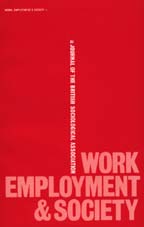No CrossRef data available.
Article contents
Researching the Changing World of Employment
Published online by Cambridge University Press: 14 June 2001
Abstract
Kate Purcell, Terence Hogarth and Claire Simm, Whose Flexibility?: The Costs and Benefits of ‘Non-Standard’ Working Arrangements and Contractual Relations, Joseph Rowntree Foundation, 1999, £13.95, 73 pp.
Ursula Huws, Nick Jagger and Siobhan O'Regan, Teleworking and Globalisation, Institute for Employment Studies Report 358, 1999, xiii+103 pp.
Many workers find themselves in increasingly vulnerable employment situations: the search for employment and for employment security is a constant concern which is heightened by employers' adoption of certain strategies for numerical flexibility. At the same time new telecommunication technologies are being used to change the nature of the labour process and the spatial organisation of work, as employers relocate work to more favourable environments with new, cheaper and more pliable workforces. In Whose Flexibility? the authors seek to discover what factors influence the use and selection of strategies for the enhancement of numerical flexibility, and what costs and benefits are associated with such strategies in the British context. In this thoughtful piece of research the authors do not view potential gains and losses merely in terms of financial savings. Their work is strengthened by the acknowledgement of the need to consider the impact on the ‘psychological contract’, that is the informal arrangements and commitments employers and employees might reasonably expect of each other, such as staying late to complete a job in return for flexibility with childcare.
- Type
- EXTENDED REVIEW
- Information
- Copyright
- 2001 BSA Publications Limited




